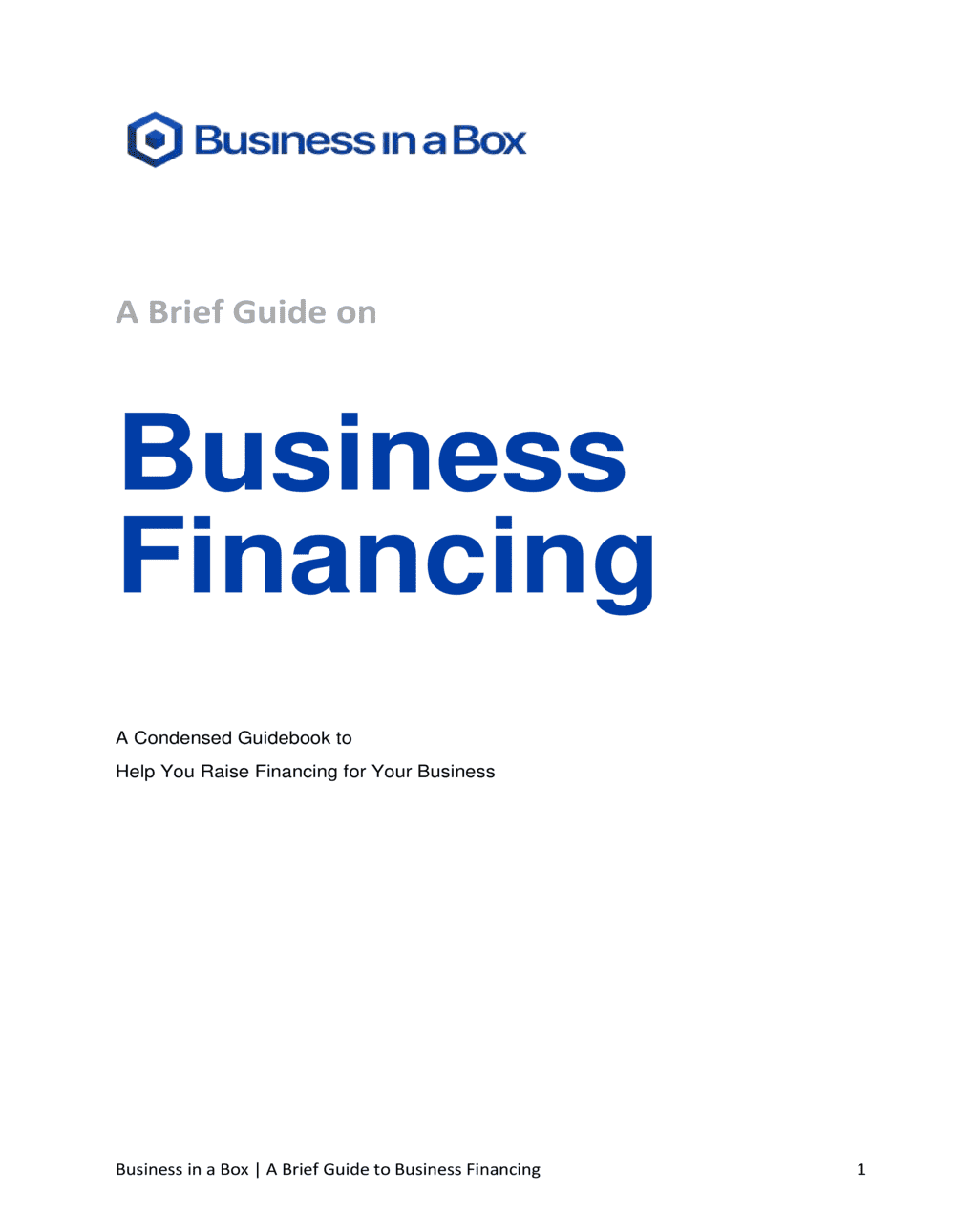Business Financing Guide

Document content
This business financing guide template has 11 pages and is a MS Word file type listed under our finance & accounting documents.
Sample of our business financing guide template:
A Brief Guide on Business Financing A Condensed Guidebook to Help You Raise Financing for Your Business Table of Contents Understanding Business Financing 3 Importance of Obtaining Business Financing 3 Beginning Capital 3 Debt Ratios 3 Staying Ready for Business Cycles 4 Chance for Growth 4 Ensuring Strength of Payroll Accounts 4 Types of Business Financing 5 Equity Financing 5 Debt Financing 6 Steps to Business Financing 8 1. Identify Financial Needs 8 2. Understand What Lenders Assess 8 3. Understand Debt Financing and the Necessary Requirements 8 4. Submit the Application 9 Factors to Consider When Financing a Business 10 Final Thoughts 11 Understanding Business Financing Most small and medium-sized enterprises often need access to capital through business financing. Even large-scale companies may look for capital infusions to meet short-term goals. Small and medium-sized enterprises need to find a reasonable funding model. Utilizing the wrong source for business financing may result in the loss of a part of the company. Some firms also experience challenges relating to repayment terms with improper business financing. Most companies with such problems often have issues with their growth in the future. Funds from business financing may be useful in hiring additional employees, equipment financing, paying for an office, and purchasing equipment. Importance of Obtaining Business Financing As a business owner, there are several imperative reasons why obtaining business financing will help your venture. Here are some significant points to note: Beginning Capital Every new business needs a method of creating and delivering products or services. Business financing is imperative to source the funds for those processes. Most business owners choose between debt and equity financing. For small enterprises, loans help owners have control over the company, but entail certain financial obligations. Debt Ratios Proper business financing from the appropriate source helps in minimizing debt ratios. During business operations, there should be more revenue and assets compared to debt, unless this leaves the company with more challenges when completing loan payments. When sourcing for business financing, a bad debt ratio can also affect a firm's ability to attract investors. Staying Ready for Business Cycles Proper business financing helps prepare a venture for the rainy days or bad economic cycles. Note that smart businesses need to prepare for poor economic cycles also by making good investments, and having good credit, cash savings, and real estate arrangements. Chance for Growth Business financing provides a chance for greater success. Companies procure more finance to make investments, acquire new capital, and handle staff and inventory challenges. Some ventures consider equity capital from a venture capitalist. Overall, it's vital to analyze the available funding sources that wouldn't hinder financial growth. Ensuring Strength of Payroll Accounts Weak payroll accounts cause loss of staff, which can ultimately lead to liquidation. Business financing enables ventures to have enough funds to handle labor costs. It's advisable to consider having adequate funding to cover two payroll cycles. Types of Business Financing For proper assessment of your business sustainability, it's imperative to know and comprehend the different types of business financing. Many firms turn to traditional bank loans as their financing choice. However, the application process may be slower and more difficult. Here are some significant business financing types to consider: Equity Financing In equity financing, the investors are owners of the business to the extent to which they invest. It typically consists of finance brought into the venture by shareholders or owners. Investors in equity financing are "angel investors" or "venture capitalists." Venture capitalists are usually firms, not individuals. These companies typically consist of accountants, lawyers, and investment advisors. In most cases, these firms also deal with large investments - above $3 million. Hence, the process can be complex and slow. Compared to venture capitalists, angel investors are rich individuals who intend to invest small amounts in a product. These wealthy individuals move fast and prefer simple terms. Benefits of Equity Financing Here are some upsides to funding your business through investors: Safety in Bankruptcy: There's no obligation to pay back if the business goes bankrupt. Investors are partial owners, not creditors. Hence, if the venture goes into liquidation, owners don't need to make any repayments. No Monthly Payments: Since there are no monthly payments, the venture has more liquid cash on hand. More liquid cash often helps with handling operating expenses. Investors are Patient: In most cases, investors understand it takes time to build a successful business. Hence, they don't apply unnecessary pressure on business owners to see the products thrive. Downsides of Equity Financing Here are some major disadvantages that come with equity financing: Partnership: Equity financing involves giving a portion of the venture to investors. The higher the investment, the more of a stake the investor wants. Sometimes, investors may get up to 50% of the company.
Reviewed on

Document content
This business financing guide template has 11 pages and is a MS Word file type listed under our finance & accounting documents.
Sample of our business financing guide template:
A Brief Guide on Business Financing A Condensed Guidebook to Help You Raise Financing for Your Business Table of Contents Understanding Business Financing 3 Importance of Obtaining Business Financing 3 Beginning Capital 3 Debt Ratios 3 Staying Ready for Business Cycles 4 Chance for Growth 4 Ensuring Strength of Payroll Accounts 4 Types of Business Financing 5 Equity Financing 5 Debt Financing 6 Steps to Business Financing 8 1. Identify Financial Needs 8 2. Understand What Lenders Assess 8 3. Understand Debt Financing and the Necessary Requirements 8 4. Submit the Application 9 Factors to Consider When Financing a Business 10 Final Thoughts 11 Understanding Business Financing Most small and medium-sized enterprises often need access to capital through business financing. Even large-scale companies may look for capital infusions to meet short-term goals. Small and medium-sized enterprises need to find a reasonable funding model. Utilizing the wrong source for business financing may result in the loss of a part of the company. Some firms also experience challenges relating to repayment terms with improper business financing. Most companies with such problems often have issues with their growth in the future. Funds from business financing may be useful in hiring additional employees, equipment financing, paying for an office, and purchasing equipment. Importance of Obtaining Business Financing As a business owner, there are several imperative reasons why obtaining business financing will help your venture. Here are some significant points to note: Beginning Capital Every new business needs a method of creating and delivering products or services. Business financing is imperative to source the funds for those processes. Most business owners choose between debt and equity financing. For small enterprises, loans help owners have control over the company, but entail certain financial obligations. Debt Ratios Proper business financing from the appropriate source helps in minimizing debt ratios. During business operations, there should be more revenue and assets compared to debt, unless this leaves the company with more challenges when completing loan payments. When sourcing for business financing, a bad debt ratio can also affect a firm's ability to attract investors. Staying Ready for Business Cycles Proper business financing helps prepare a venture for the rainy days or bad economic cycles. Note that smart businesses need to prepare for poor economic cycles also by making good investments, and having good credit, cash savings, and real estate arrangements. Chance for Growth Business financing provides a chance for greater success. Companies procure more finance to make investments, acquire new capital, and handle staff and inventory challenges. Some ventures consider equity capital from a venture capitalist. Overall, it's vital to analyze the available funding sources that wouldn't hinder financial growth. Ensuring Strength of Payroll Accounts Weak payroll accounts cause loss of staff, which can ultimately lead to liquidation. Business financing enables ventures to have enough funds to handle labor costs. It's advisable to consider having adequate funding to cover two payroll cycles. Types of Business Financing For proper assessment of your business sustainability, it's imperative to know and comprehend the different types of business financing. Many firms turn to traditional bank loans as their financing choice. However, the application process may be slower and more difficult. Here are some significant business financing types to consider: Equity Financing In equity financing, the investors are owners of the business to the extent to which they invest. It typically consists of finance brought into the venture by shareholders or owners. Investors in equity financing are "angel investors" or "venture capitalists." Venture capitalists are usually firms, not individuals. These companies typically consist of accountants, lawyers, and investment advisors. In most cases, these firms also deal with large investments - above $3 million. Hence, the process can be complex and slow. Compared to venture capitalists, angel investors are rich individuals who intend to invest small amounts in a product. These wealthy individuals move fast and prefer simple terms. Benefits of Equity Financing Here are some upsides to funding your business through investors: Safety in Bankruptcy: There's no obligation to pay back if the business goes bankrupt. Investors are partial owners, not creditors. Hence, if the venture goes into liquidation, owners don't need to make any repayments. No Monthly Payments: Since there are no monthly payments, the venture has more liquid cash on hand. More liquid cash often helps with handling operating expenses. Investors are Patient: In most cases, investors understand it takes time to build a successful business. Hence, they don't apply unnecessary pressure on business owners to see the products thrive. Downsides of Equity Financing Here are some major disadvantages that come with equity financing: Partnership: Equity financing involves giving a portion of the venture to investors. The higher the investment, the more of a stake the investor wants. Sometimes, investors may get up to 50% of the company.
Easily Create Any Business Document You Need in Minutes.

Download or open template
Access over 3,000+ business and legal templates for any business task, project or initiative.

Edit and fill in the blanks
Customize your ready-made business document template and save it in the cloud.

Save, Share, Export, or Sign
Share your files and folders with your team. Create a space of seamless collaboration.



